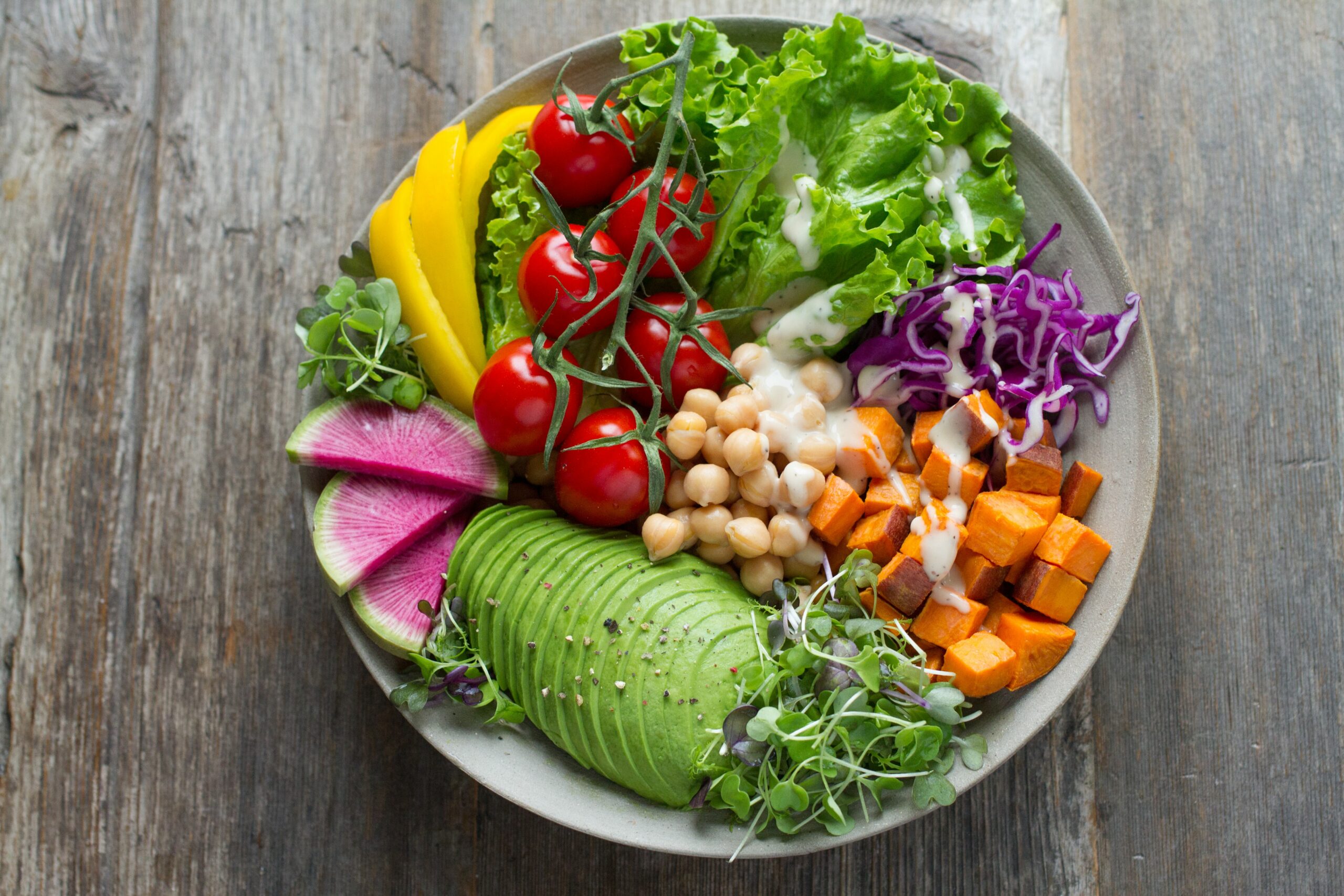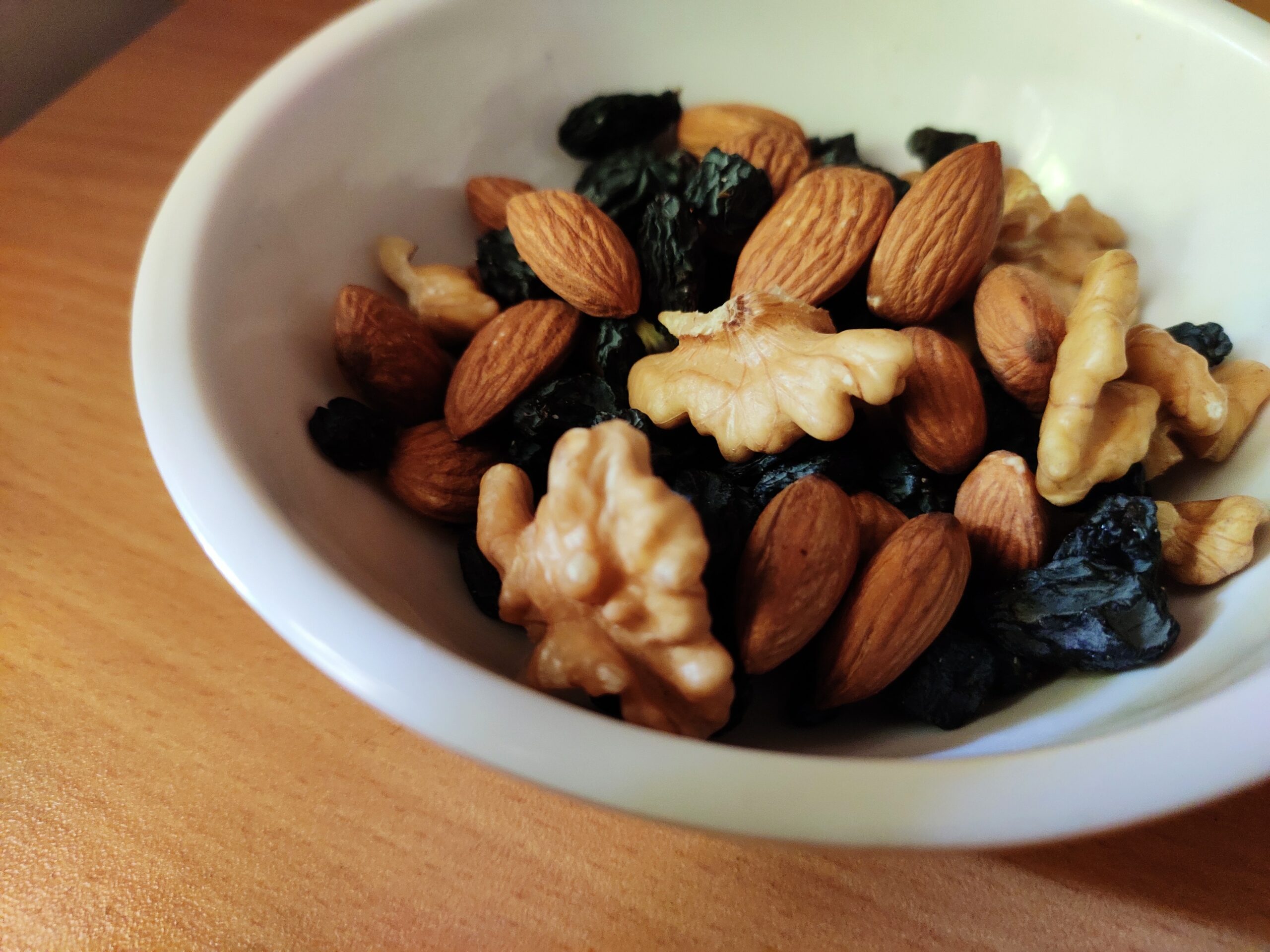- Tip #1: Work with a nutritionist
- Tip #2: Incorporate supergreens into your daily diet
- Tip #3: Pick a time to fast
- Tip #4: Fill your day with plants
- Tip #5: Hydrate!
- Tip #6: Choose low glycemic foods
- Tip #7: Eat until 80% full
- Tip #8: Replace saturated fats with healthy fats
- Tip #9: Eat the foods you love
- Tip #10: Add lots of flavors
- Tip #11: Meal prep
- Tip # 12: When setting goals, focus on adding—not subtracting
- Commonly asked questions about healthy eating
- Where can I find a good nutritionist?
- Types of nutritionists available based on your needs
- Am I a good candidate to work with a nutritionist?
- How do I find a nutritionist near me?
- Ask your doctor
- Check with your insurance company
- Consult local hospitals
- Inquire at your local public health department
- Investigate colleges in your area
- How do hormone fluctuations affect our health?
- Why is healthy eating important?
- Are superfoods just a marketing scam?
- What are some immune-boosting superfoods?
- How does stress affect healthy eating habits?
- What is supergreens powder?
- What are some healthy eating tips while eating out?
- The Healthy Living Scholarship
The following article is by Rachel Gargano MS, RD, CSSD, CBS. All specific opinions, advice, as well as product and service suggestions, are her own.
It’s an age-old question: What should I eat to be healthy? With all the information out there the answer isn’t always easy to come by. Yet, healthy eating plays a vital role in our health.
In fact, the foods you eat can impact your risk of developing chronic diseases such as diabetes, heart disease, high blood pressure, and even some cancers (1,2). You can have an enormous influence on your health simply by choosing the right foods to fuel your body.
But because how we eat is so tightly linked with our emotional and mental state, it’s important to work on building a healthy relationship with food at the same time as you build positive eating habits.
The good news is that healthy eating doesn’t have to be difficult, nor does it need to be bland. With a few tips, a bit of patience, and a handful of self-compassion, you can be on your way to eating a healthy diet that is also delicious.
Read on to learn 12 tips to start eating healthy.
Tip #1: Work with a nutritionist

Nutrition is incredibly individual. Every person has unique nutritional needs, different taste preferences, and distinctive calorie requirements. This makes following just any old diet challenging, not to mention that the likelihood of success is low in the long run.
To get the best results and a personal approach, invest in your health by working with a nutritionist (here’s a resource to help you find one). A dietitian-nutritionist is an expert in all things food and nutrition and can develop an individualized plan to help you reach your healthiest self.
Tip #2: Incorporate supergreens into your daily diet
With our fast-paced life, it can be difficult to fit in the recommended amount of vegetables. In fact, only 10% of Americans are meeting the goal of 2 to 4 cups of vegetables per day (3).
This is where supergreens powder comes in. Finding the right one, such as those from Enso Superfoods, can enhance your diet by adding powerful antioxidants, vitamins, minerals, and beneficial herbs and probiotics.
While whole vegetables are still an important part of your diet, greens powder is an easy and convenient way to get a boost of some key nutrients, support your immune system, and add a kick of energy to your day.
Tip #3: Pick a time to fast
When it comes to eating, one of the most difficult stretches of the day is after dinner. In an attempt to relax and unwind, we let our guard down. For many, this means reaching for extra snacks for comfort, even if we’re full from dinner. Studies have shown that too much eating later at night may be linked with poor health outcomes (4,5).
Rather than letting nighttime eating get the best of you, designate a time to ‘close the kitchen’.
Pro tip: Choose one thing to eat or drink to signify to your body and mind that eating has ended for the day. This may be a piece of fruit or a cup of non-caffeinated tea. With consistency and time, you will stop craving other foods after the ‘kitchen is closed.’
Tip #4: Fill your day with plants

Time and time again, studies indicate that a diet rich in plants—vegetables, fruit, nuts, seeds, beans, and whole grains—is most linked to positive health outcomes and reduced risk of chronic disease (6). Plants have a high nutrient density, adding fiber and healthy fats to your eating pattern.
This doesn’t mean giving up animal products if you don’t want to, but rather filling your plate with colorful, whole vegetables and fruit, choosing whole grains, and adding plants wherever you can throughout your day. Remember: The more color, the better!
Try adding at least one fruit or vegetable to all meals and most snacks (Level up: add two veggies at each meal!). Sprinkle yogurt and salads with nuts and seeds, add baby spinach and frozen fruit to your smoothies, and toss beans and diced or shredded veggies into soups, burrito filling, and even your pasta sauce.
Tip #5: Hydrate!

Water is one of the most important and yet most overlooked nutrients our body requires. Fluids are needed to help regulate our core temperature, carry nutrients to cells, and remove waste from the body. But even more than that, being well hydrated can help boost your energy, help keep skin healthy, as well as help promote focus, mood, and concentration (7).
Men need about 13 cups of fluids per day while women need about 9 cups (8). Your total fluid needs are higher than this, but foods should help boost your intake to meet this target.
Pro tip: Tired of plain water to meet your fluid needs? Add a squeeze of citruses, such as lemon or lime; crushed mint or cucumber; or add some bubbles for a more enticing drink.
Tip #6: Choose low glycemic foods
Carbohydrates are important for energy, but choosing the right ones will bring your health to the next level. This macronutrient is the only one that affects our blood sugar. The amount your blood sugar goes up after eating a carb is related to the food’s glycemic index.
High glycemic carbs are refined carbohydrates, often with more sugar and less fiber. These are broken down quickly by the body, creating a spike in blood sugar. These carbs include highly processed foods such as white bread, rice cakes, crackers, bagels, cookies, and most sugary breakfast cereals. Junk food often falls into this category.
The problem is that too many blood sugar spikes throughout the day may impact your risk for chronic illnesses, including cardiovascular disease and type 2 diabetes (9).
Choose low glycemic carbohydrates that are whole grains and higher in fiber as often as possible. These will be minimally processed and take more time to break down. They generally result in a lower glycemic response, so your blood sugar rises at a slower, healthier pace.
Make healthier food choices by eating these higher-quality carbohydrates. These typically unprocessed foods include fresh and canned beans, fresh fruits and vegetables, nuts, legumes, and whole grains.
Wondering what diet is best for you? Find the best nutritionists for you.
Tip #7: Eat until 80% full
Hara hachi bu is a Japanese phrase that means ‘eat until you are 80% full.’ This is a wonderful way to think about your hunger and satiety, helping you eat fewer calories.
When we eat too quickly, we may miss our body’s fullness signals and eat beyond what we need. Slowing down during meals allows more time to register how much you’ve eaten. It allows you to stop eating when you are just satisfied.
Pro tip: This strategy works very well while dining out when portions are often much bigger than necessary. Know that it’s okay to stop eating when you are only slightly full, which may be well before your plate is completely empty.
Tip #8: Replace saturated fats with healthy fats

Saturated fat has a bad rep. And while more studies are needed, we do know that replacing some saturated fat with polyunsaturated fat may help reduce the risk of cardiovascular disease (10). Health benefits of unsaturated fats include helping lower bad cholesterol, reducing plaque build-up in your arteries, and potentially helping to reduce your blood pressure (11).
Get more healthy fats in your eating pattern by including fatty fish, walnuts, sunflower seeds, chia seeds, ground flax seeds, and olive oil.
While the nutritional value of these foods is high, so are their calories. If your goal is to lose weight, keep portion sizes of nuts, seeds, and oils moderate to help with eating fewer calories.
Tip #9: Eat the foods you love
Avoiding the foods you love is a recipe for disaster. To be successful, a long-term healthy eating plan should always include the foods that make you happy.
This doesn’t mean giving yourself free access to nosh on these foods all day long. A successful diet has healthy boundaries. Eat the foods you adore mindfully and slowly, allowing for full enjoyment, and stopping at a reasonable portion. You want to feel good long after you eat the food and avoid the guilt.
Use the ‘sandwich’ technique for sweet or salty cravings:
- Eat a full, balanced meal first.
- Then, enjoy a portion of the craved food.
- Finally, eat an apple or have some tea.
Eating a meal first ensures you are full before and less likely to go overboard with the treat. Having the fruit, tea, or another healthy food after gets the taste out of your mouth to help prevent you from going back for more.
Tip #10: Add lots of flavors

Many people think a healthy diet must be bland and blah. But this doesn’t have to be the case! To avoid having just steamed flavorless foods, add your favorite herbs, spices, and seasonings.
A few flavorful suggestions:
- Toss steamed green beans with olive oil, salt, and pepper
- Sprinkle roasted broccoli with lemon and parmesan
- Shower baked cauliflower with Tajin or another flavorful seasoning blend
- Toss chicken with oregano, garlic powder, paprika, salt, and pepper before baking or grilling
- Wrap a lean white fish in tin foil along with lemon slices, cherry tomatoes, sprigs of thyme, and smashed garlic cloves
Tip #11: Meal prep
Don’t go into the week without intention. As Benjamin Franklin said: “If you fail to plan, you plan to fail.”
After a long, stressful day, we aren’t always in our best frame of mind to think about what’s for dinner. Prevent self-sabotage by taking a bit of time on the weekend to plan out your healthy meals for the week and go grocery shopping so that you’re prepared.
Pro tip: Meal planning doesn’t have to be anything too intensive. Start out by planning just 2 to 3 meals to make during the week, using leftovers for lunch or the next day’s dinner. Think about other commitments you have and fit in cooking when you know you’ll be most successful. Write down your dinner plans on a sticky note and pin them to the fridge.
Tip # 12: When setting goals, focus on adding—not subtracting
We often take things away from our diet because they are ‘bad’ for us… but this makes us crave them more. Rather than thinking about all the things you shouldn’t eat, focus instead on all the things you want to add.
For example:
- Eat fruits and vegetables with every meal
- Choose whole, healthy snacks over-packaged foods most of the time
- Choose whole grains over refined
- Drink 8 cups of water every day
- Include fatty fish twice per week
- Go for a 10-minute walk as often as I can during the week as I can
- Feel the sunshine on my face every day
Nowhere on here do you see “don’t eat chocolate” or “cut out carbs.” These negative goals will only make you unhappy and potentially set you up for failure.
Commonly asked questions about healthy eating
Are you feeling energized and ready to tackle healthy eating? There’s never a better time to start than right now. Here are some additional tips to help bring your health to the next level.
Where can I find a good nutritionist?
Start your search online. The great thing about today’s world is that we have so many incredible resources at our fingertips. A company like Top Nutrition Coaching can help you find the right type of nutritionist based on your needs.
You can find dietitian nutritionists to help with weight loss, diabetes, prenatal and postnatal nutrition, sports performance nutrition, renal function, hormone regulation, gut health, and so many other health conditions. Your nutritionist will also help come up with healthy recipes that are delicious and satisfying to help you reach your goals.
Losing weight and eating healthier doesn’t have to be hard.
Types of nutritionists available based on your needs
Sports Nutritionists
Cyclists and triathletes are the two types of individuals who most commonly seek out the help of a sports nutritionist or dietician. That said, you don’t need to be an elite or professional athlete to benefit from an expert.
Sports nutritionists can help athletes improve their body composition if they are trying to gain muscle mass or lose body fat and improve their race results. Sports nutritionists can also guide athletes through meal planning and prep and help them determine the best fluids to drink before, during, and after exercise to avoid dehydration and over-hydrating.
If you have any food allergies or abiding by a vegan or plant-based diet, a sports nutritionist can also help you consume the nutrients you need to support your exercise and training.
Pregnancy nutritionists

Trying to figure out what foods you should consume during pregnancy is stressful and overwhelming. Rather than relying on google searches, pregnant women can seek a pregnancy nutritionist trained to help women learn about the proper diet and nutrition required for a healthy pregnancy. Whether you have a special diet, a food allergy, or struggle with weight issues, a prenatal nutritionist can help answer your questions.
Aside from growing another human inside of your body, pregnancy comes with a whole host of other symptoms, including nausea, cramping, headaches, bloating, constipation, and food aversions. Regardless of what symptoms you are experiencing, a prenatal nutritionist is there to help you tackle the issue and solve the problem.
Weight loss nutritionists
While food restrictions, trendy diets, and weight loss pills may seem tempting, these methods can often be hazardous. If you are trying to lose weight, a weight loss nutritionist can help you go about this process in a healthy and safe way. After factoring in your lifestyle and any current health conditions, this specialized nutritionist will create a customized meal plan that’s best suited for you.
This specific meal plan will include what foods to eat and portion sizes. A weight-loss nutritionist may also help guide you through basic exercise routines, how to adjust your current levels of physical activity, and changes you can make to your overall lifestyle.
Prenatal & postpartum nutritionists
Prenatal and postpartum nutritionists work with expecting mothers to teach them about the nutrition they need during the pre-pregnancy, pregnancy, and post-childbirth periods. Whether you are worried about your current diet or simply want to ensure that you are taking care of your baby in the best way that you can, a prenatal or postpartum nutritionist will guide you through your pregnancy in the healthiest way possible.
Without guidance, pregnant women are often not consuming the nutrition they need to best support their baby. Some women are afraid of excess weight gain, limiting their food intake, while others struggle to consume enough food due to nausea and other common pregnancy symptoms.
A prenatal and postpartum nutritionist can help you work around these issues to consume the adequate nutrition needed for both you and your baby.
Breastfeeding nutritionists
While many expecting mothers worry about nutrition during pregnancy, it’s just as important to pay attention to what you eat after birth. As you breastfeed, you provide your child with vital nutrients that they need for growth and health. If you follow a vegetarian or vegan diet, it is essential to choose foods that will give you and your baby the nutrients that you need.
There are general rules that you can follow as a breastfeeding mother, including consuming foods rich in iron, protein, and calcium, as well as integrating supplements into your daily routine. A breastfeeding nutritionist will give you more specific information about your diet that is catered to your lifestyle.
Renal nutritionists
Renal nutritionists are experts in diet and nutrition, specifically for individuals with kidney disease. Whether you were just diagnosed with kidney disease or have recently undergone a kidney transplant, you will need to consult with a renal nutritionist for specific dietary information.
While other nutritionists may only be in your life for several months, renal nutritionists see their patients often and for years at a time. This may seem overwhelming at first, but it also allows nutritionists to become very accustomed to their patient’s food aversions and preferred foods to create a customized diet that’s healthy and enjoyable for each of their patients.
Abiding by your nutritionist’s strict food and fluids plan is crucial to managing your kidney disease.
GI nutritionists
Monitoring and maintaining the food that goes into your body is crucial if you live with gastrointestinal disease. Whether you are suffering from chronic constipation, irritable bowel syndrome (IBS), gastroparesis, small intestine bacterial overgrowth, or another gastrointestinal disease, a GI nutritionist will be able to improve your quality of life.
After completing an initial consultation, a GI nutritionist will guide you through an approachable diet that factors in your clinical data, nutritional intake, socioeconomic background, and lifestyle. Sticking to the provided meal plan will help improve appetite, prevent undesirable weight loss, correct dietary deficiencies, optimize digestive functioning, promote positive eating behaviors, and reduce exposure to foods that can trigger a patient’s symptoms.
Pediatric nutritionists

Pediatric nutritionists design nutrition plans for children and families; the process starts with completing an evaluation. In this assessment, they will evaluate the dietary needs of a child and develop a plan that’s tailored toward their food preferences, allergies, and existing health conditions.
Pediatric nutritionists are not just for children suffering from illnesses or chronic health conditions. Many families will seek out pediatric nutritionists to help ensure that their child is healthy and growing at an average rate. Consulting with a pediatric nutritionist can also help prevent a child from developing diabetes and obesity and help encourage lifelong healthy eating habits.
Am I a good candidate to work with a nutritionist?
If you question whether or not you are an excellent candidate to work with a nutritionist, the answer is most likely “yes.” Whether you are pregnant or looking to lose weight, there is a nutritionist out there that specializes in your area of need. That said, here are a few general examples of individuals who might benefit from consulting with a nutritionist.
If your child is experiencing strange symptoms such as eczema, a runny nose, ear infection, diarrhea, or constipation, then there’s a chance that they have an unknown food allergy. Food allergies are difficult to discover, even with blood tests.
A pediatric nutritionist can help guide you and your child through a healthy and safe food elimination process. By eliminating certain foods from your child’s diet, a pediatric nutritionist will discover whether or not your child is allergic to a particular food or if something else is causing their symptoms. If your child has a food allergy, then the pediatric nutritionist can help you build a nutritionally complete diet plan for your child.
While all athletes can benefit from consulting a sports nutritionist, athletes with chronic illnesses can significantly benefit from outside help. Some of the most common conditions that affect athletic performance include diabetes, anemia, food allergies, thyroid issues, and irritable bowel syndrome. While medication can help improve these health conditions, they will still impact your overall energy, endurance, and muscle strength.

A sports nutritionist will be able to help alleviate some of the stress these conditions are placing on your body and help ensure you are consuming the proper nutrients to improve your athletic performance.
Individuals diagnosed with gestational diabetes can significantly benefit from seeking the help and assistance of a prenatal nutritionist. Nearly 10% of women get diagnosed with gestational diabetes during pregnancy. The good news is that this disease can be treated almost entirely through an adjusted diet. If your gestational diabetes is constantly monitored throughout your pregnancy, you have a very high chance of delivering a perfectly healthy baby.
How do I find a nutritionist near me?
If you’ve decided that you would benefit from consulting with a nutritionist, the next step is finding the best one for you. Keep in mind that this is not a one size fits all approach. Googling “best nutritionists near me” may not yield the results you want. With research, time, and patience, you will find the best person to help you on your health journey. Here are a few simple approaches you can take.
Ask your doctor
One of the best places to start your search for a nutritionist is by asking a current, trusted healthcare provider. Your general practitioner will most likely know of qualified nutritionists in your area of interest and can connect you with that individual. If your doctor doesn’t know of someone, then they connect you with another doctor that might.
Start by telling your doctor that you are interested in nutrition counseling, and then ask if they have any recommendations. This is going to be the quickest and easiest way of connecting with a nutritionist that you can trust.
Check with your insurance company
An increasing number of health insurance companies are now providing coverage for nutrition counseling. Do some investigating into your particular provider and whether or not they cover nutrition counseling. If they do, which health providers do they work with? This is another quick and easy shortcut to finding not only a trusted nutritionist but also an affordable nutritionist.
Consult local hospitals
Depending on what type of nutritionist you are seeking out, you may be able to find someone in your area of interest at your local hospital. Many hospitals have registered dietitians on staff who can provide nutrition counseling services. Again, even if the hospital does not have a nutritionist in your area of interest, they may be able to connect you with an expert who is.
Inquire at your local public health department
Does your community have a local health department? If so, this is another resource that you can utilize. Public health departments often have programs geared towards low-income families who cannot afford to work with nutritionists otherwise. Some of the programs offered at public health departments include nutrition programs for women, infants, and children (WIC).
Investigate colleges in your area
Lastly, many colleges and universities will have entire departments dedicated to nutrition. While some departments do hire practicing experts, at the very least, someone in the department may be able to connect you with someone who specializes in your desired area.
Once you have found both a credible and affordable nutritionist, do a little further digging before you begin working with them. Ask your potential nutritionist about their education and credentials. Where did they go to school, and what degree did they earn? You will want someone with a bachelor’s degree in dietetics, public health, or another health science. While a professional title can tell you about an individual’s expertise, some health workers who lack these titles are still qualified to provide nutrition counseling services.
How do hormone fluctuations affect our health?
Hormones are chemicals that travel throughout our bodies to help control our body’s development. Hormones have a far more significant impact on our day-to-day lives than most people think. Hormones regulate many of our daily functions from our blood sugar and blood pressure, growth and fertility, sex drive, metabolism, and sleep.
Fluctuations in mood, anxiety or depression, irregular or painful periods, headaches, insomnia, gastrointestinal issues, and increased hair growth can all be signs that you are experiencing a hormone imbalance. Many different factors can cause a hormone imbalance, including stress, birth control, poor diet, and environmental hazards.
Why is healthy eating important?
Being smart about your food choices is one of the easiest ways you have control over your health. Good nutrition helps lower your risk for chronic diseases, helps you maintain a healthy weight, and can even help increase energy and lower stress.
To eat healthier often means choosing water over sugary beverages, whole grain bread over white, having fresh vegetables and fruit more often, and making your own meals over eating out.
It’s not about being perfect though—know that it will take time to get to your best overall health and healthy body weight (if your goal is to lose weight).
Are superfoods just a marketing scam?
No, superfoods are not just a marketing scam. Many health benefits come with integrating superfoods into your daily life. While each superfood brand may differ in quality and ingredients, most have a very high nutritional density. This means that superfoods provide lots of nutrients but very few calories.
Packed full of vitamins and minerals, superfoods can promote cardiovascular health and weight loss, boost energy levels, and even have anti-aging benefits. Superfoods are also known to protect your body from toxins, lower cholesterol, control metabolism, and reduce inflammation. While superfoods are incredibly beneficial, they must be supplemented by a healthy, balanced diet to be effective.
What are some immune-boosting superfoods?
Consuming certain foods can help your body ward off sickness and disease and keep your immune system strong and healthy.
If you develop a cough, sore throat, runny nose, or other common cold symptoms, citrus fruit is an excellent immune-boosting superfood. Citrus fruit is packed full of vitamin C. Vitamin C can help increase the production of white blood cells, which help fight off infections. The next time you feel the onset of a cold, add grapefruit, oranges, clementines, lemons, and limes to your grocery list. Red bell peppers and spinach are also packed full of vitamin C.

Meanwhile, ginger can help decrease inflammation, whether you are experiencing a sore throat or nausea. Almonds are rich in vitamin E, a potent antioxidant that can help maintain a healthy immune system.
How does stress affect healthy eating habits?
Many factors contribute to obesity across the nation, including stress. During times of stress, people tend to turn to high-calorie and high-fat foods.
When you feel stressed, your body sends out a stress hormone called cortisol. This hormone makes your body crave foods full of sugar, salt, and fat because your body believes you need fuel to fight off an incoming threat.
This unhealthy behavior is compounded by the fact that individuals already store more fat when they are stressed than when they are relaxed. Some people are more prone to emotional eating than others. The best way to combat stress or emotional eating is to be aware of what triggers stress and resist the temptation of consuming unhealthy foods.
What is supergreens powder?
Take nutrient-dense vegetables and herbs, add probiotics and other health-benefiting ingredients, and turn them into a greens powder—now you have a highly nourishing addition to your daily diet. Nutritious supergreens are an easy way to get vitamins, minerals, and powerful antioxidants by simply mixing them into recipes and drinks.
What are some healthy eating tips while eating out?
Eating out doesn’t have to be off the table while you’re trying to lose weight or continue to eat healthily. Here are some tips to help keep you on track:
- Look at the menu ahead of time. Decide what would be a good choice for you without the influence of what others may be choosing and without being too hungry!
- Start with a salad or broth-based veggie-packed soup. Taking the edge off your hunger can help you have better control of how much you eat your main meal.
- Once your food comes, look at it and decide how much would make you 80% full. Eat slowly to help stick to that amount. Stop if you feel satisfied early.
- Ask for sauces and dressings on the side. While delicious, these can add up to 100 calories per tablespoon.
What are you waiting for? Start eating healthy today!
The Healthy Living Scholarship
Maintaining your health is important and can contribute to a higher quality of life, not only in the present but down the road as well. This $500 annual scholarship seeks to support students who are passionate about health, wellness, and leading physically and mentally healthy lives. The deadline for applications is August 15 of every year, with winners announced one month later on September 15.
Any high school senior, undergraduate, or graduate student who’s passionate about health and wellness and is a US citizen or permanent legal resident may apply for this scholarship.
Just click to apply below and share why a healthy lifestyle is important to you!
Details:
- Amount: $500
- Application deadline: July 20
- Recurrence: Annual
Eligibility:
- Education Level: High school senior, undergraduate, or graduate student
- Citizenship: US citizen or permanent legal resident
Sources for article
- Franzago M, Santurbano D, Vitacolonna E, Stuppia L. Genes and Diet in the Prevention of Chronic Diseases in Future Generations. Int J Mol Sci. 2020;21(7):2633. Published 2020 Apr 10. doi:10.3390/ijms21072633 https://www.ncbi.nlm.nih.gov/pmc/articles/PMC7178197/
- Di Renzo L, Gualtieri P, Romano L, et al. Role of Personalized Nutrition in Chronic-Degenerative Diseases. Nutrients. 2019;11(8):1707. Published 2019 Jul 24. doi:10.3390/nu11081707 https://www.ncbi.nlm.nih.gov/pmc/articles/PMC6723746/
- U.S. Department of Agriculture and U.S. Department of Health and Human Services. Dietary Guidelines for Americans, 2020-2025. 9th Edition. December 2020. https://www.dietaryguidelines.gov/sites/default/files/2020-12/Dietary_Guidelines_for_Americans_2020-2025.pdf
- Chaix A, Manoogian ENC, Melkani GC, Panda S. Time-Restricted Eating to Prevent and Manage Chronic Metabolic Diseases. Annu Rev Nutr. 2019;39:291-315. doi:10.1146/annurev-nutr-082018-124320 https://pubmed.ncbi.nlm.nih.gov/31180809/
- Kinsey AW, Ormsbee MJ. The health impact of nighttime eating: old and new perspectives. Nutrients. 2015;7(4):2648-2662. Published 2015 Apr 9. doi:10.3390/nu7042648 https://www.ncbi.nlm.nih.gov/pmc/articles/PMC4425165/
- Kim H, Caulfield L, Garcia-Larsen V, et al. Plant-Based Diets are Associated with a Lower Risk of Incident Cardiovascular Disease, Cardiovascular Disease Mortality, and All-Cause Mortality in a General Population of Middle-Aged Adults. JAHA. 2019. 8(16). https://doi.org/10.1161/JAHA.119.012865 https://www.ahajournals.org/doi/10.1161/JAHA.119.012865
- Liska D, Mah E, Brisbois T, Barrios PL, Baker LB, Spriet LL. Narrative Review of Hydration and Selected Health Outcomes in the General Population. Nutrients. 2019;11(1):70. Published 2019 Jan 1. doi:10.3390/nu11010070 https://www.ncbi.nlm.nih.gov/pmc/articles/PMC6356561/
- Institute of Medicine of the National Academies. Dietary Reference Intakes for Water, Sodium, Potassium, Chloride, and Sulfate. 2005. National Academy of Sciences. https://www.nal.usda.gov/sites/default/files/fnic_uploads/water_full_report.pdf
- Chiu CJ, Liu S, Willett WC, et al. Informing food choices and health outcomes by use of the dietary glycemic index. Nutr Rev. 2011;69(4):231-242. doi:10.1111/j.1753-4887.2011.00382.x https://www.ncbi.nlm.nih.gov/pmc/articles/PMC3070918/
- Hooper L, Martin N, Abdelhamid A, Davey Smith G. Reduction in saturated fat intake for cardiovascular disease. Cochrane Database Syst Rev. 2015;(6):CD011737. Published 2015 Jun 10. doi:10.1002/14651858.CD011737 https://pubmed.ncbi.nlm.nih.gov/26068959/
- NIH National Library of Medicine. Facts about Polyunsaturated Fats. MedlinePlus.gov. Updated May 2020. Accessed 7 February 2022. https://medlineplus.gov/ency/patientinstructions/000747.htm




